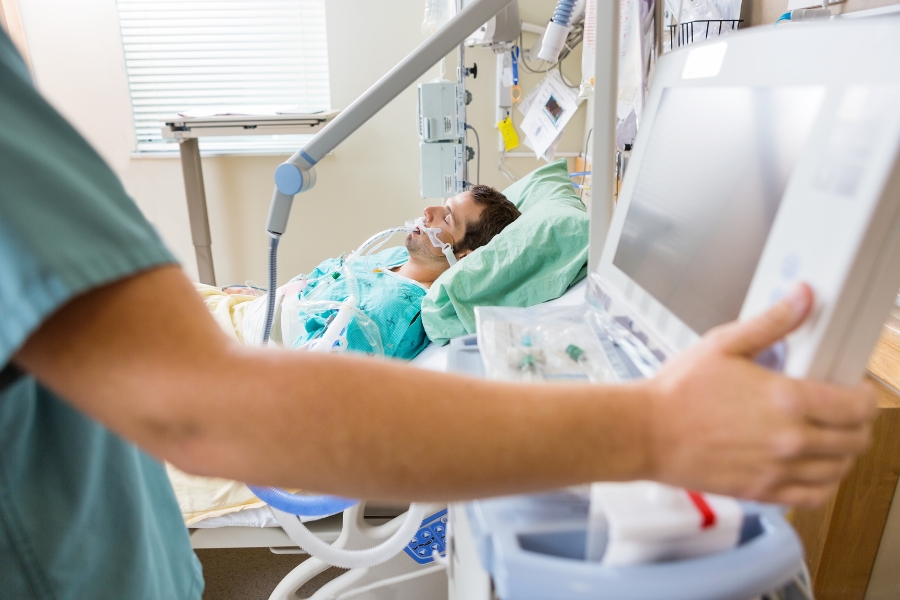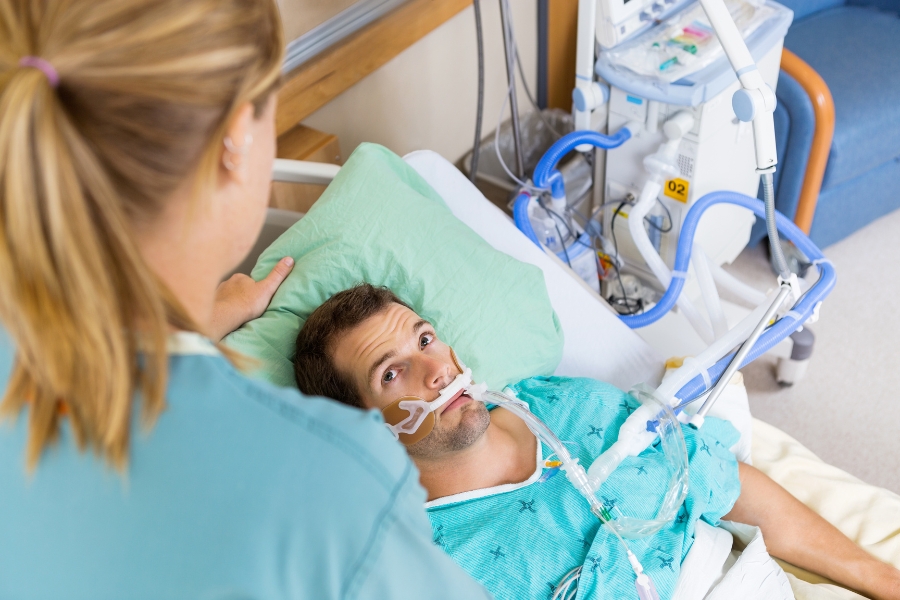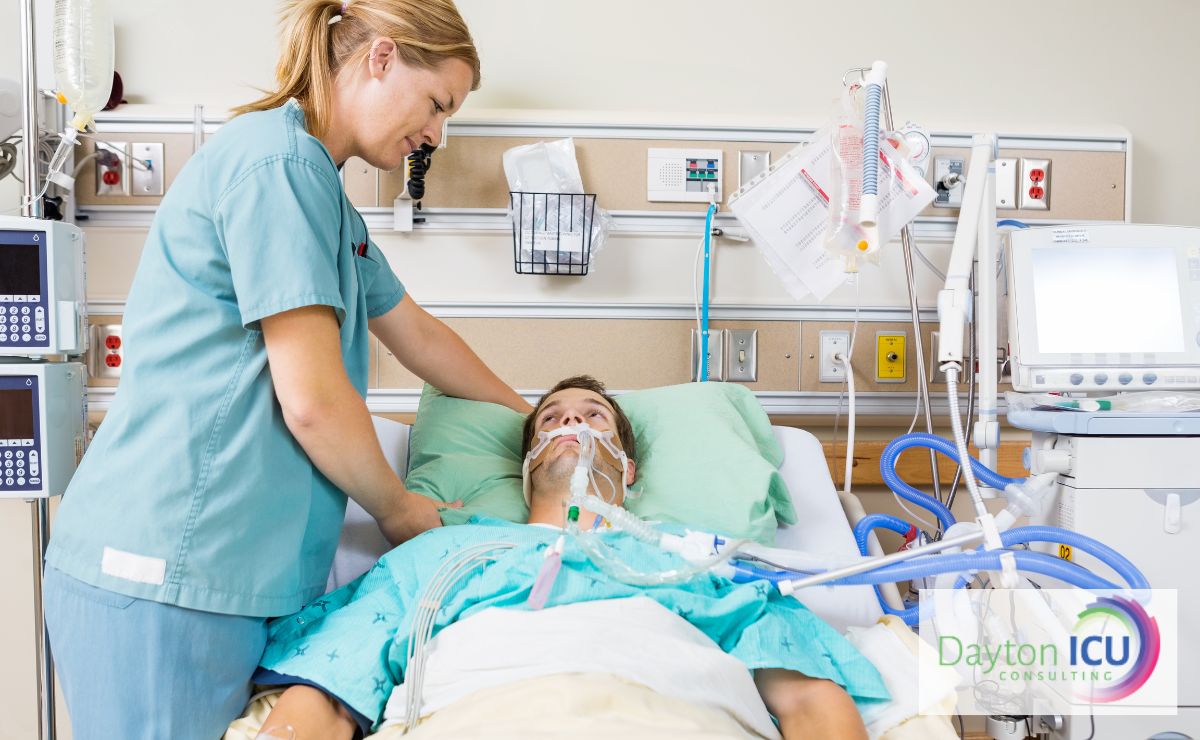Critical care is an extraordinary and complex specialty that’s continually evolving, with a growing capacity to save and extend life in the face of the most extreme perils.
Research, knowledge, and technological developments have transformed nursing skills and our ability to care for patients who are critically ill.
Unfortunately, the nursing values and ethics, which should be informing the care we provide, have struggled to remain a guiding force in critical care nursing.
Part of the reason for this is that nurses continue to be saddled with a growing list of responsibilities – expected to monitor dozens of numbers, and numerous lines, drains, and devices, while juggling multiple providers and procedures, and being burdened with insurmountable charting.
And this ever-increasing list of duties exacerbates the assembly line approach to ICU care that automatically sedates and immobilizes patients when there’s no indication for it.
Fortunately, things don’t have to be this way, as more and more clinicians are learning that the evidence-based protocols found in the ABCDEF Bundle offer a better way to care for ICU patients.
The ABCDEF Bundle provides tools that guide ICU teams to keep patients as awake, communicative, autonomous, and mobile as possible during critical illness.
The Bundle challenges decades of culture in critical care medicine that is rooted in automatic sedation and immobility for all intubated patients on mechanical ventilation.
This begs the question, as the roles and duties of nurses grow with critical care medicine, can we preserve our original mission, and maintain our nursing values?
Have we left behind the core nursing values of autonomy, accountability, compassion, curiosity, professionalism, altruism, and innovation?
Or can the ABCDEF Bundle help to realign nurses with the core values and ethics of nursing?
How Nursing Values Are Lost in Current ICU Culture

Working in a system-based environment with an ingrained culture of sedation and immobility makes it all too easy to lose sight of the human being inside every sick body.
And the most effective way to dehumanize patients in this way is to ignore nursing values by depriving them of their autonomy, ability to communicate, connection with loved ones, and their physical function and independence.
In other words, the best way to dehumanize a patient is to sedate them.
With that in mind, let’s explore how the standardization of automatic sedation and immobility for all patients on mechanical ventilation creates significant barriers to the preservation of nursing values in the ICU.
Autonomy
When patients are sedated, they are no longer allowed to be part of their journey and are deprived of autonomy.
They are not able to be informed, communicate their wants and needs, and are shut out of being involved in making decisions for their own bodies and lives.
Even after sedation is discontinued, delirium and ICU-acquired weakness from sedation leave many patients vulnerable, dependent, and still deprived of autonomy.
Compassion
Nurses are innately deeply compassionate, but it’s challenging to know patients as unique individuals when they’re unresponsive.
It’s also easy to lose compassion, as patients can become more like a bag of physiology with the only sign of life being the monitors showing vital signs.
When they’re sedated and unable to connect with their caregivers, it’s impossible for nurses to know what patients are experiencing and just as difficult to meet their emotional, spiritual, and physical needs.
Altruism
Nurses have altruistic intentions, but the cultural norm of routine continuous sedation for all patients fails to protect patients from harm.
For example, delirium doubles the risk of dying in the hospital, and increases the risk of long-term brain injury by up to 120 times, and continuous sedation increases the risk of delirium by 216%.
Nurses unknowingly orchestrate life-threatening and life-altering harm in the form of delirium and ICU-acquired weakness, as a result of sedation and immobility. This is far from true altruism.
Curiosity
Sedation and immobility culture has been inherited from generations of clinicians over the past three decades and it continues to go unquestioned.
In most ICUs, if a patient is going to be intubated, they will be sedated and comatose regardless of the nuances of their condition. This trained blindness deprives nurses of the value of curiosity.
And as a result of this lack of curiosity, they are not taught to ask questions like:
- “Is my patient in pain?”
- “What do they want and need for their care?”
- “Is sedating them necessary and following best practices?”
- “How can we protect their brain and muscles during critical illness?”
- “How can I preserve their autonomy during mechanical ventilation?”
- “How can they connect with their loved ones for support during their critical illness?”
Instead, they’re pressured to accept the malignant normalcy of automatic sedation and immobility and continue “what has always been done.”
Innovation
The conveyor belt routine of immediate continuous sedation after intubation and throughout mechanical ventilation removes the demand to understand and meet the patient’s needs.
These cultural norms instill a “one-size-fits-all” mentality that stifles nursing innovation.
Accountability
An ICU environment that follows cultural sedation practices rather than evidence-based sedation management does not hold nurses accountable.
And when nurses aren’t adequately trained, supported, and monitored, then RASS scores, for instance, can become inaccurate, delirium screening won’t be performed correctly, and awakening trials aren’t successfully executed.
Patients remain comatose and in bed without further assessment or regulation.
Professionalism
Such a culture persists in oblivion to the harm sedation and immobility cause.
Unfortunately, this can also create tension between disciplines when a physical or occupational therapy colleague attempts to challenge sedation administration and advocate for early mobility.
Nurses who are not educated in the latest evidence-based practices, like those found in the ABCDEF Bundle, may become fearful of having patients awake and mobile, as they’re unsure of how to navigate these new situations with professionalism.
The Shift to Awake and Walking ICUs

An Awake and Walking ICU will have a team that prioritizes keeping patients as awake, communicative, autonomous, and mobile as possible.
And they achieve these objectives through the use of the ABCDEF Bundle, which is a collection of tools to help manage patients during critical illness and help them to survive and thrive.
Some of the key components of this approach include:
- Giving sedation only when there is an indication for it
- Using the safest sedative at the lowest dose for the shortest duration possible
- Ensuring patients are promptly performing their highest level of mobility, unless there is a contraindication
- Eliminating visitation restrictions for loved ones
This approach empowers nurses and reconnects them with the core nursing values that should be informing their care.
With that in mind, let’s look at how these nursing values are applied in an Awake and Walking ICU.
Autonomy
Ensuring patients are promptly awakened after intubation keeps their cognition and fine motor skills intact so they can be autonomous and communicate using non-verbal methods.
They’re informed of their condition and involved in decision-making about their treatments, and they remain as strong and mobile as possible to do as much as they can for themselves.
Compassion
Preserving patients’ ability to communicate helps nurses get to know patients personally, aside from just their sick bodies.
This inspires compassion as nurses come to understand and care about what matters to each individual patient, and it allows them to better identify and address patients’ personal needs.
Moreover, they’re able to know and honor their patients’ wants and wishes and can also educate patients’ families on what’s happening with their health and keep them engaged with their loved ones.
Altruism
The ABCDEF Bundle decreases 7-day mortality by 68% and protects patients from the suffering and potentially life-long disability of post-ICU syndrome, which occurs as a result of delirium and ICU-acquired weakness.
This enables nurses to be better equipped to heal their patients from critical illness without causing more harm, which gives patients the best chance to survive and thrive in and after the ICU.
What’s more, this approach empowers nurses to master altruism in their practice.
Curiosity
In order to transform sedation and mobility practices in the ICU, nurses have to be curious and open to learning more.
They must utilize the most up-to-date evidence to overcome long-established beliefs and culture they’ve inherited from past generations of clinicians.
In addition, they have to be willing to try new things, develop new skills, and foster a curiosity for who each patient truly is, what they’re experiencing, and what they need and want for their care and for their lives.
Remaining curious will help them find ways to ensure each patient can stay as awake and mobile as possible during critical illness.
Accountability
An Awake and Walking ICU encourages each clinician to ask questions like, “Is there an indication for sedation?” and “Are we protecting this patient from delirium and ICU-acquired weakness?”
This type of ICU team demands accurate documentation and routine reviews of data to ensure that patients are receiving the highest dose of the ABCDEF Bundle as possible.
This kind of culture brings in a high level of accountability for nurses as they learn to use sedation cautiously while accurately assessing for delirium and promptly mobilizing patients.
Professionalism
The responsibility for the implementation of the ABCDEF Bundle does not solely fall on the shoulders of nurses.
It does, however, provide an opportunity for nurses to exemplify professionalism as they work collaboratively with their colleagues from other disciplines.
This helps them to develop their professionalism, as they come to understand and respect the expertise that each member of the ICU team offers.
Innovation
Although the ABCDEF Bundle is not a new concept, it does require an innovative spirit, especially for teams that continue to prioritize automatic sedation and immobility for all intubated patients.
Nurses must be open to a new approach to care and demonstrate innovation as they strive to keep their patients awake, communicative, autonomous, and mobile.
Final Words
Without a doubt, Awake and Walking ICUs are the future of critical care medicine.
And through education, training, safe staffing, interdisciplinary collaboration, and an evidence-based culture and practices, the ABCDEF Bundle will help clinicians to revive the core nursing values that will allow us to transform patient care and outcomes.
Do you want your team to master the ABCDEF Bundle? If you’re ready to create an Awake and Walking ICU, contact me today or use my calendar to book a free consultation.




